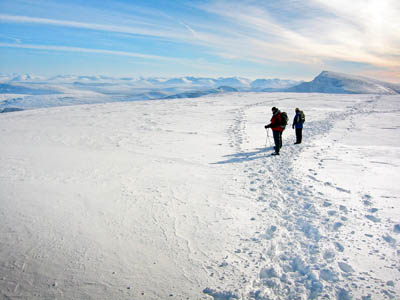Mountain experts have issued a 10-point checklist to help keep walkers and climbers safer during the winter months.
The Mountaineering Council of Scotland said shorter days and adverse weather conditions require preparation for the potential problems that can arise on a winter day or night spent on the Scottish hills.
The council’s chief officer David Gibson said: “There is a poignant quote that goes: ‘Good judgement comes from experience; experience comes from bad judgement’.
“Having considered a selection of typical winter pitfalls, the MCofS has developed a winter check list which we hope will help hillwalkers and climbers to enhance their ability to make good judgements and return home safe from enjoyable days in the mountains.”
- Check your head-torch and GPS batteries are in good condition; renew them if they’re fading and always carry a spare set of batteries in your rucksack. Always check that everyone you go on the hill with has a head-torch
- Carry a mobile phone whenever possible, but be aware that you won’t always get reception in remote places. Register with the SMS Emergency Text Service before you set out www.emergencysms.org.uk.
- Carry an emergency survival bag or bivvy shelter with you in winter
- Check that your crampons fit your boots before using them, and get into the habit of putting them on before you reach icy ground
- Carry your ice-axe and know how to use it.
- Carry a big enough rucksack in winter. Using the same rucksack that you carry in summer is a recipe for an uncomfortable day when you are carrying extra winter kit
- Carry sufficient extra layers of clothing in winter. The temperature drops quickly as darkness falls and you should plan for unexpected delays and the possibility that you could be out on the hill for an extended period in the event of an incident
- Always check the mountain weather forecast before going out and be prepared to change your plans.
- Always check the sportscotland Avalanche Information Service avalanche forecast and modify your route when the forecast indicates avalanche conditions on your planned route
- Know when to turn back: the summit is only the half-way point of your journey
MCofS mountain safety adviser Heather Morning added: “Now that the clocks have turned back it is time for anyone who goes out onto the Scottish hills in winter to give serious thought to preparing themselves and their kit for the season ahead.
“If there are one or two points in this list of 10 that you hadn’t previously thought about then do something about it before your next trip to the hills.”
Further details are on the MCofS website.

G
10 November 2011GPS at No.1 in check list? No mention of map and compass, mmmm how interesting!
Craig
12 November 2011Yep, utterly bizarre that there is nothing about having a map and compass and knowing how to use them; late back procedure too? Seems you only need to carry a car battery and you should be fine!
Stephen
06 December 2015G, Craig- I believe the checklist is in addition to your summer bag/check list, (the list doesn't mention food or drink but no questions raised on these vital items).
Rayner Pitt
02 January 2017Waterproof jacket, trousers and boots - preferably breathable - must make a big difference.
Ki
11 July 2017TBH anyone venturing out in Scottish Hills in winter who doesn't consider the above is really setting themselves/ companions up for some pain and as far as the basics of food, map/compass (and skills), clothing etc absolutely need to emphasise that. Also advising others of route and times and poss alterations as well as safety check ins for reporting missing person(s).